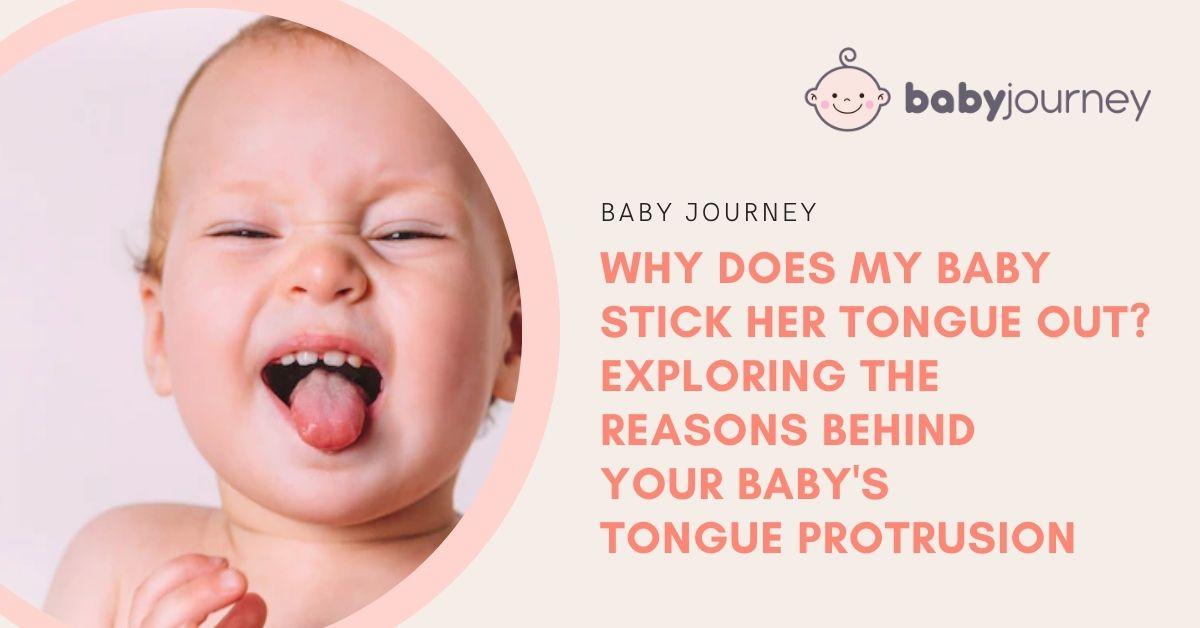Parents always wondering “Why does my baby stick her tongue out?” Babies are known for making all sorts of cute and funny faces, including sticking their tongues out. But have you ever wondered why babies do this? Is it just a reflex or is there a deeper meaning behind it?
At around 4 months old, babies begin to develop their tongue movements and start exploring their mouth. This is when you may notice your baby sticking their tongue out more often. It’s a natural part of their oral development and can be a sign that they are learning how to control their tongue.
In some cases, babies may stick their tongue out as a reflex. This is known as the tongue-thrust reflex and is present from birth. It helps facilitate breastfeeding by allowing the baby to latch onto the nipple and suckle. However, this reflex typically disappears around 4-6 months of age as the baby’s oral motor skills develop.
Understanding Baby’s Tongue Movements

Babies are known for their adorable and often funny behaviors, such as sticking their tongue out. This behavior is common in babies, and it can have different meanings depending on the situation. Understanding why babies stick their tongues out can help parents and caregivers better understand their little ones.
Reflexes
For babies under six months of age, sticking the tongue out can be a natural reflex. The tongue thrust reflex is a common reflex that babies exhibit, which helps them with feeding. When babies are hungry, they will stick their tongue out to latch onto their mother’s nipple or the bottle’s nipple. The tongue thrust reflex helps babies to suckle and swallow milk.
Playful Behavior
Babies may also stick their tongue out as a playful behavior. This behavior is often seen in older babies who are exploring their environment and testing their oral motor skills. When babies stick their tongue out playfully, it is usually a sign that they are feeling happy and content.
Imitation
Babies are also known for imitating the behavior of adults and other children around them. If a baby sees an adult or an older child sticking their tongue out, they may try to imitate the behavior. This imitation can be a sign that the baby is trying to communicate or bond with the people around them.
Habit or Tongue Protrusion
Sometimes babies stick their tongue out because it has become a habit. This behavior can be seen in babies who have been sticking their tongue out for a while. It can also be a sign of tongue protrusion, which is a condition where the tongue sticks out of the mouth involuntarily. Tongue protrusion can be caused by various medical conditions, such as Beckwith-Wiedemann syndrome, acromegaly, and congenital hypothyroidism.
In summary, babies stick their tongue out for different reasons, including natural reflexes, playful behavior, imitation, habit, or tongue protrusion. Understanding why babies stick their tongues out can help parents and caregivers better understand their little ones and respond appropriately to their needs.
The Role of Age in Tongue Sticking

Babies are known for sticking their tongues out, and it is a natural part of their development. The age of the baby can play a significant role in tongue sticking, and it is important to understand the reasons behind it.
Newborns and Infants
Newborns and infants are known to stick their tongues out frequently. This is because they are learning how to use their mouth and tongue to explore their surroundings. They often use their tongue to feel and taste different objects, and it is a natural part of their development.
4 Months Old
At around four months old, babies start to develop more control over their tongue and mouth muscles. They may stick their tongue out more frequently as they learn to coordinate their movements. It is also common for babies to stick their tongue out during feeding as they learn to suck and swallow.
Learning and Developmental Delays
If a baby continues to stick their tongue out excessively beyond four months old, it could be a sign of a developmental delay or a medical condition. It is important to consult a pediatrician if there are concerns about the baby’s development or behavior.
In conclusion, tongue sticking is a natural part of a baby’s development, and the age of the baby can play a significant role in it. As babies learn to control their tongue and mouth muscles, they may stick their tongue out more frequently. However, if there are concerns about the baby’s development or behavior, it is important to consult a pediatrician.
Feeding and Tongue Sticking

Babies stick their tongue out during feeding for a variety of reasons. The tongue-thrust reflex, which is present at birth, is one of the most common reasons. This reflex helps babies to latch onto the nipple while breastfeeding. As babies grow, they may continue to stick their tongue out during feeding as a habit.
In some cases, tongue sticking may indicate an issue with feeding. For example, if a baby is having difficulty swallowing or is experiencing pain while eating, they may stick their tongue out as a way to avoid the food. Additionally, if a baby is hungry or full, they may stick their tongue out as a way to communicate their needs.
When introducing solid foods, babies may also stick their tongue out as they learn to eat. This is because they are still learning how to swallow food properly and may need to experiment with different techniques. Parents should be patient and offer a variety of solid foods to help their baby learn how to eat.
Overall, tongue sticking during feeding is usually not a cause for concern. However, if a baby is experiencing difficulty with feeding or is consistently sticking their tongue out, it is important to speak with a pediatrician. The doctor can help determine if there are any underlying issues that need to be addressed.
In summary, babies may stick their tongue out during feeding for a variety of reasons, including the tongue-thrust reflex, hunger, fullness, and difficulty with swallowing. Parents should be patient and offer a variety of foods to help their baby learn how to eat properly. If there are any concerns with feeding, it is important to speak with a pediatrician for guidance.
Tongue Sticking as a Sign of Teething

Babies often start teething around 4 to 6 months old, and it’s common for them to stick their tongues out during this time. Teething can be a painful process for babies, and they may use their tongues to soothe their gums.
When a baby’s teeth are breaking through, the pressure from beneath the gums can be uncomfortable. To relieve the pressure, babies often chew on objects or body parts. An example of this might be baby fist in mouth, baby chewing on fingers, or, you guessed it, baby biting on tongue. Tongue chewing is a sign of teething.
If a baby has swollen gums, they may stick their tongue out more often than usual. Swollen gums are a common symptom of teething, and they can be painful for babies. The pressure from the teeth pushing through the gums can cause swelling and discomfort.
It’s important to note that not all babies will stick their tongues out when they are teething. Every baby is different, and they may have different ways of coping with the discomfort of teething. Some babies may be fussier than usual, while others may drool excessively or refuse to eat.
In summary, tongue sticking is a common sign of teething in babies. Babies may stick their tongues out to soothe their gums or relieve pressure from their teeth. Swollen gums are also a common symptom of teething and can cause discomfort for babies. However, not all babies will stick their tongues out when they are teething, and every baby is different in how they cope with the discomfort.
Health Conditions Related to Tongue Sticking

Babies with Down syndrome and Beckwith-Wiedemann syndrome may stick their tongue out most of the time, along with other signs and symptoms. Down syndrome is a genetic disorder that affects physical and intellectual development, and babies with this condition may have a small mouth, poor muscle tone, and a large tongue. Beckwith-Wiedemann syndrome is a congenital overgrowth disorder where infants are born larger than normal, and it can cause macroglossia, where the tongue is larger than usual and may not fit in the mouth.
Other conditions that can cause tongue sticking in babies include micrognathia, where the jaw is small and may cause the tongue to protrude, and Pierre Robin syndrome, where the lower jaw is underdeveloped and the tongue may fall back into the throat. Cleft palate, a birth defect that affects the roof of the mouth, can also cause tongue protrusion.
Tongue sticking may also be a symptom of hypotonia, a condition where there is a decrease in muscle tone, or hypothyroidism, a disorder where the thyroid gland does not produce enough hormones. Cerebral palsy, a group of disorders that affect movement and coordination, may also cause tongue protrusion.
Tongue sticking can also be related to oral cancer, although this is rare in babies. Injuries to the tongue or mouth can cause tongue protrusion, as well as medical conditions like digeorge syndrome, where there are genetic differences that affect the immune system and other body systems.
If a baby is sticking their tongue out frequently and it is not related to feeding or a muscle reaction, it is important to speak with a healthcare professional to rule out any underlying health conditions.
Parental Response to Tongue Sticking

When a baby sticks out their tongue, it can be a cause for concern for some parents. However, it is often a natural reflex and not a cause for alarm. Parents and caregivers should respond to tongue sticking in a respectful and attentive manner.
It is important for parents to understand that tongue sticking is a common behavior in babies and is usually not a sign of a serious problem. While it is natural for parents to worry about their child’s health and development, it is important to remain calm and not overreact to this behavior.
When a baby sticks out their tongue, parents should respond with a neutral and confident tone. They should avoid being rude or dismissive of the behavior, as this can cause the child to feel ignored or unsupported. Instead, parents should acknowledge the behavior and offer reassurance to the child.
Parents can also use this opportunity to observe their child’s behavior and look for any signs of discomfort or distress. If the behavior persists or is accompanied by other symptoms, parents should consult with a pediatrician or healthcare provider to rule out any underlying medical issues.
In conclusion, parents and caregivers should respond to tongue sticking in a respectful and attentive manner. It is important to remain calm and not overreact to this behavior, as it is often a natural reflex. If parents have concerns about their child’s health or development, they should consult with a pediatrician or healthcare provider.
Consulting a Pediatrician

If you are concerned about your baby sticking their tongue out, it is always best to consult a pediatrician. A pediatrician can help diagnose any underlying issues that may be causing your baby to stick their tongue out.
During the appointment, the pediatrician will ask you questions about your baby’s behavior and medical history. They may also perform a physical exam to check for any abnormalities in your baby’s mouth or throat. Based on the information gathered, the pediatrician may recommend further testing or refer you to a specialist for a more detailed diagnosis.
It is important to be aware that some babies may stick their tongue out as a natural reflex or as a way to explore their surroundings. However, if you notice that your baby is sticking their tongue out excessively or in a way that seems abnormal, it is important to bring this to the attention of your pediatrician.
In addition to providing a diagnosis, a pediatrician can also offer advice on how to manage your baby’s behavior. They may recommend techniques to help your baby stop sticking their tongue out or refer you to a specialist who can provide further support.
Overall, consulting a pediatrician is an important step in understanding why your baby is sticking their tongue out and how to address the issue. By working together with your pediatrician, you can ensure that your baby receives the best possible care.
Treatment and Therapy Options

If a baby’s tongue protrusion is caused by an underlying medical condition, treatment may be necessary. The treatment will depend on the underlying cause and may involve physical therapy or medical intervention.
In cases where tongue thrust reflex is causing the protrusion, no treatment is necessary, and the reflex will typically disappear by the age of 6 months. However, if the reflex persists beyond this age, a speech-language pathologist may be able to help.
If a baby has macroglossia, or a large tongue, treatment may not be necessary if the condition is mild. However, if the macroglossia is severe, it may interfere with feeding or breathing and require medical intervention. In some cases, surgery may be necessary to reduce the size of the tongue.
If the tongue protrusion is caused by a genetic condition, treatment may involve managing the symptoms of the condition. For example, if the protrusion is caused by Beckwith-Wiedemann syndrome, treatment may involve monitoring the child’s growth and development and managing any associated health problems.
In some cases, tongue protrusion may be a sign of a developmental delay or other underlying condition. In these cases, early intervention is important. A pediatrician or other healthcare provider can evaluate the child and recommend appropriate treatment or therapy options.
Overall, the treatment and therapy options for tongue protrusion in babies will depend on the underlying cause of the condition. However, with early intervention and appropriate treatment, many babies with tongue protrusion can go on to lead healthy, happy lives.
Conclusion

In conclusion, sticking out the tongue is a natural reflex for babies. It can have several causes, including hunger, oral motor skill development, teething, and genetic differences. The tongue-thrust reflex is a common reflex that babies are born with, which includes sticking the tongue out to facilitate breastfeeding or bottle feeding. This reflex typically disappears between 4 to 6 months of age.
Parents should not worry if their baby sticks out their tongue frequently, as it is a normal part of development. However, excessive tongue-sticking-out might warrant a closer look. In some cases, it could be a sign of an underlying medical issue, such as tongue-tie or sensory processing disorder. Parents should consult with their pediatrician if they have concerns about their baby’s tongue-sticking-out behavior.
It’s important to note that every baby is unique and may have different reasons for sticking out their tongue. Some babies may stick out their tongue more frequently than others, and that’s okay. As long as the baby is meeting their developmental milestones and appears healthy, parents should not worry too much about tongue-sticking-out behavior.
Overall, sticking out the tongue is a normal part of a baby’s development, and parents should not be alarmed if their baby does it frequently. If parents have concerns about their baby’s tongue-sticking-out behavior, they should consult with their pediatrician for further evaluation.
Frequently Asked Questions
What age do babies typically start sticking their tongue out?
Babies typically start sticking their tongue out at a young age, usually within the first few weeks of life. This is a natural reflex that helps with breastfeeding and bottle feeding. As babies grow and develop, they may continue to stick their tongue out as a way of exploring their environment.
Why do babies stick their tongue out at a young age?
Babies stick their tongue out at a young age because of the tongue thrust reflex, which is a natural reflex that helps with breastfeeding and bottle feeding. This reflex typically disappears around 4-6 months of age, but some babies may continue to stick their tongue out as a way of exploring their environment.
What are some reasons a baby may stick their tongue out repeatedly?
Babies may stick their tongue out repeatedly for a variety of reasons, including natural reflexes, hunger, and genetic differences. In some cases, sticking the tongue out repeatedly may be a sign of an underlying medical condition, such as a neurological disorder.
Is sticking the tongue out a sign of teething in babies?
Sticking the tongue out is not necessarily a sign of teething in babies. While teething can cause some babies to drool more, it is not typically associated with sticking the tongue out.
How can I tell if my baby’s tongue poking out is normal or a cause for concern?
If your baby’s tongue poking out is accompanied by other symptoms, such as difficulty feeding, trouble breathing, or excessive drooling, it may be a cause for concern and you should seek medical attention. However, if your baby is otherwise healthy and happy, sticking the tongue out is likely a normal part of their development.
Why do some babies stick their tongue out and make bubbles?
Some babies stick their tongue out and make bubbles as a way of exploring their environment and learning about cause and effect. This is a normal part of their development and is nothing to be concerned about.


 PARENTING TIPS
PARENTING TIPS PREGNANCY
PREGNANCY BABY CARE
BABY CARE TODDLERS
TODDLERS TEENS
TEENS HEALTH CARE
HEALTH CARE ACTIVITIES & CRAFTS
ACTIVITIES & CRAFTS


